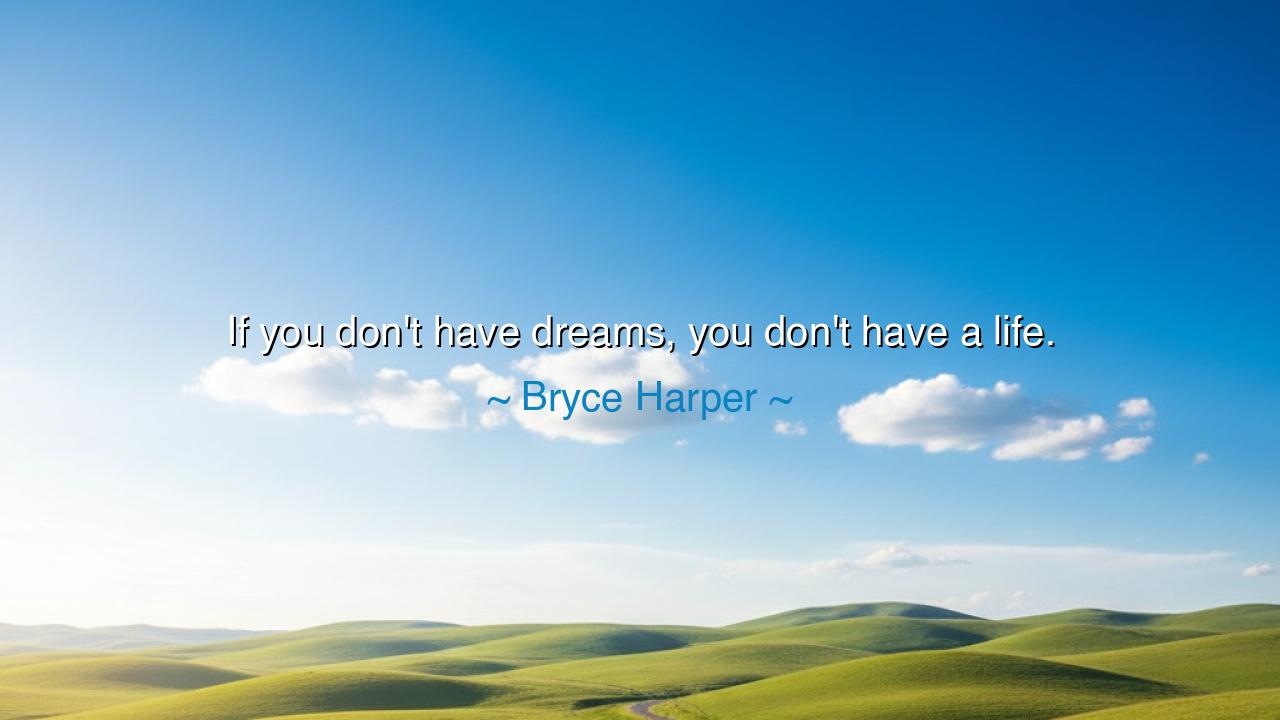
If you don't have dreams, you don't have a life.






“If you don’t have dreams, you don’t have a life.” Thus spoke Bryce Harper, a man whose triumphs on the field of baseball were born from the fire of vision rather than the comfort of ease. In this simple yet profound truth, Harper joins the chorus of the ancients who have long declared that dreams are the soul’s breath—that they are not mere fancies of the night, but the living essence of purpose. For what is a life without dreams but a body without spirit, a ship without a course, a heart that beats yet does not aspire?
To live without dreams is to wander through existence half-awake. Dreams are the north star of the human spirit, the divine whisper that says, “You were made for more.” They are not idle wishes; they are the callings that awaken courage, endurance, and faith. Harper, who rose from humble beginnings to stand among the greats, knew that the road to glory is not paved with luck but with vision—that invisible force that drives a person to rise each morning with fire in their heart. He reminds us that to dream is to live, and to cease dreaming is to begin to die long before the body fails.
Throughout history, those who changed the course of the world were not the content or the comfortable, but the dreamers—those who dared to see what was not yet visible. Consider the story of Thomas Edison, who endured a thousand failures before the light he imagined became real. Many mocked his efforts, calling him a fool for chasing the impossible. But he, like Harper, understood that the dreamer’s task is not to seek approval, but to obey the inner vision that others cannot see. And when his light finally shone, it illuminated not only the darkness of his lab but the path of all humankind.
Dreams are the wellspring of resilience. When a person knows what they long for, they can endure what others cannot. The ancient warriors of Greece and Rome did not march to battle merely for conquest, but for the dream of honor and immortality. So too do modern heroes—artists, builders, teachers, athletes—strive for the unseen prize. It is the dream that gives meaning to struggle and turns suffering into strength. For every strikeout, every failure, every dark night of doubt, the dream stands as the silent promise: “Rise again.”
Harper’s words are also a warning. In a world that worships comfort and convenience, it is easy to forget the sacred necessity of aspiration. Many live in quiet resignation, trading their dreams for security, their potential for predictability. But such a life, though safe, is hollow. The ancients would call it a living death—a soul untended, a flame unlit. The dreamless person may avoid failure, but they also forfeit greatness. For to live without dreaming is to surrender one’s divine inheritance: the power to imagine, to strive, to create.
Yet the dream alone is not enough. It must be followed by discipline and labor, the sweat that turns vision into reality. Harper’s own journey was not one of ease; his dream demanded sacrifice. From boyhood, he devoted himself to endless hours of training, knowing that the dream without effort is a mirage. Likewise, every dreamer must pair their vision with action. The seed of a dream grows only when watered by persistence, by faith, by courage in the face of doubt. The world belongs not merely to those who dream, but to those who work their dreams into being.
So, my children of tomorrow, let this wisdom take root in your hearts. Dream fiercely, but live your dreams through deed. Do not fear to reach higher, to desire more, to imagine beyond what the eyes can see. When you stumble, remember that even the stars are born from darkness. Let your dream be your guide through storm and stillness alike. For as Bryce Harper has said, and as the wise have known since the dawn of time—if you don’t have dreams, you don’t have a life. Guard them, nurture them, and let them lead you toward the destiny that awaits those who dare to believe.






AAdministratorAdministrator
Welcome, honored guests. Please leave a comment, we will respond soon